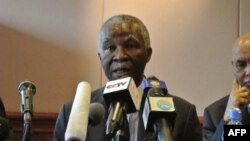ADDIS ABABA —
Sudan and South Sudan have agreed to implement joint security arrangements. But it is unclear how the two countries might suffer if they fail to put the arrangements into force.
Delegations of the Sudanese and South Sudanese Joint Political and Security Mechanism, or JPSM, met in Ethiopia on Tuesday to discuss the implementation of security agreements between the two countries.
African Union mediator Thabo Mbeki says all matters relating to security were discussed.
“They have agreed that steps will be taken immediately to ensure the creation of a safe demilitarized border zone. They have agreed on where that border zone is, which would mean that any South Sudanese forces that are north of that zone should move south -- 10 kilometers away from the center line, and the Sudan forces would also move 10 kilometers north of that border line,” Mbeki said.
The neighboring countries signed the security agreements in September, along with other accords relating to economic and trade matters. Neither country has implemented any of the agreements.
Mbeki says the two countries have not been given a deadline to carry out troop withdrawals.
“Now in the agreement, it says within seven days, but in reality it’s going to take longer. And the reason it will take longer is because in particular locations where these troops will be [are] positions [where] there is no water. So work will have to be done to make sure that water is provided for the troops that will be located there,” Mbeki said.
South Sudan's defense minister, John Kong Nyuon, says that an ad hoc commission has been established in case there are disagreements on how the accords are implemented.
“Whenever there is any case, complaints from each of the parties, the JPSM co-chairs will give the task to the ad hoc committee to verify and investigate the allegations and report to the co-chairs, for the co-chairs will decide on the issue and there will be the final hour, if necessary, [during which] they will take it to the two heads of state,” Nyuon said.
Discussion of other outstanding issues such as the disposition of the Abyei region and disputed border areas have been postponed until January. President Omar al-Bashir of Sudan and President Salva Kiir of South Sudan are expected to meet to finalize those issues.
South Sudan gained independence from Sudan last year after a long civil war. Relations between the two countries have been tense ever since. Disputes over an occupied oil field in April almost sparked another war.
Delegations of the Sudanese and South Sudanese Joint Political and Security Mechanism, or JPSM, met in Ethiopia on Tuesday to discuss the implementation of security agreements between the two countries.
African Union mediator Thabo Mbeki says all matters relating to security were discussed.
“They have agreed that steps will be taken immediately to ensure the creation of a safe demilitarized border zone. They have agreed on where that border zone is, which would mean that any South Sudanese forces that are north of that zone should move south -- 10 kilometers away from the center line, and the Sudan forces would also move 10 kilometers north of that border line,” Mbeki said.
The neighboring countries signed the security agreements in September, along with other accords relating to economic and trade matters. Neither country has implemented any of the agreements.
Mbeki says the two countries have not been given a deadline to carry out troop withdrawals.
“Now in the agreement, it says within seven days, but in reality it’s going to take longer. And the reason it will take longer is because in particular locations where these troops will be [are] positions [where] there is no water. So work will have to be done to make sure that water is provided for the troops that will be located there,” Mbeki said.
South Sudan's defense minister, John Kong Nyuon, says that an ad hoc commission has been established in case there are disagreements on how the accords are implemented.
“Whenever there is any case, complaints from each of the parties, the JPSM co-chairs will give the task to the ad hoc committee to verify and investigate the allegations and report to the co-chairs, for the co-chairs will decide on the issue and there will be the final hour, if necessary, [during which] they will take it to the two heads of state,” Nyuon said.
Discussion of other outstanding issues such as the disposition of the Abyei region and disputed border areas have been postponed until January. President Omar al-Bashir of Sudan and President Salva Kiir of South Sudan are expected to meet to finalize those issues.
South Sudan gained independence from Sudan last year after a long civil war. Relations between the two countries have been tense ever since. Disputes over an occupied oil field in April almost sparked another war.




